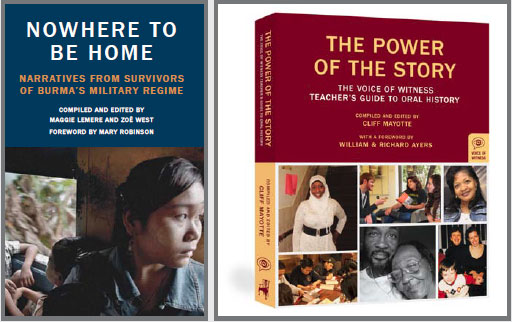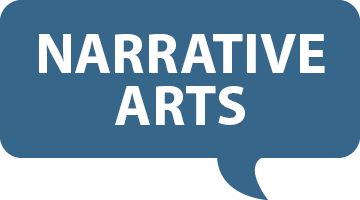Case Study: Voice of Witness / Panta Rhea Foundation

OVERVIEW
- Project summary: Oralhistory book series that educates a mass readership of students, teachers, and others on human rights crises; outreach is done via educational organizations, class visits, workshops, book talks, and other events.
- Narrative challenge: Developing strategies with partner organizations and invested communities to ensure that the books have an ongoing positive impact.
- Evaluation metrics: Number and diversity of audiences reached, books sold, and schools and organizations incorporating the books into their curricula and advocacy work.
- Websites: VoiceOfWitness.org PantaRhea.org
Hla Min tells a story about when he was 9 years old. “It was a school holiday on the full moon day in November, and we were making a picnic. …At around 8 p.m., one of my friends and I went out to buy some chicken. At that moment, an army truck came and took us.” The two children were being taken as soldiers in the armed conflicts in Burma.
His account is one of 22 life stories in the book Nowhere to Be Home: Narratives From Survivors of Burma’s Military Regime, compiled and edited by Maggie Lemere and Zoë West, for the Voice of Witness oral-history book series. Lemere recalls the interview, which took place in a dusty hotel room in southern Bangladesh when Hla Min was a teen: “We pulled together several chairs and sat in a circle. He spent the whole night speaking to us, because he knew he would have to return the next day to the tobacco farm where he worked, so this was his only chance to get his story out.” There’s a similarly urgent feel to many of the stories in Voice of Witness’s growing catalogue of oralhistory books about human rights crises around the world, such as undocumented workers in the U.S. or displaced people of Sudan.
The organization’s executive director, Mimi Lok, says the books provide a “nuanced look,” almost “novelistic” in their depth, so that readers “end up spending time with a person and their life experience over the length of a long-form narrative.” This is vital to understanding human rights, which mean nothing unless one has a sense of the humanity of the people whose rights are being violated.
“The first thing
we encourage our
interviewers to ask
is ‘What was your
childhood like?’ We’re
determined to represent
the whole person and
their whole life, so we
start from the start.
Otherwise the narrator
can feel violated—that
the only interesting thing
about themselves is
the fact that they were
victimized.”
—Dave Eggers, cofounder,
with Lola Vollen,
of Voice of Witness, as
quoted on the Haas Jr.
Fund website
Voice of Witness’s education program uses the stories in their book series to introduce teachers and students to socially relevant, oral-historybased curricula. Offerings include The Power of Story, a teacher’s guide on oral history; “Amplifying Unheard Voices,” a four-day oral-history workshop for educators and cultural workers; “Our Town, Our Voices Summer Lab,” a two-week program for teens; and other supports such as consultations with teachers, classroom visits, specialized trainings, and lesson plans. To extend the reach and impact of its books, the organization is increasingly partnering with educational and rights groups such as Facing History and Ourselves, Aim High, Human Rights Watch, and the Fred T. Korematsu Institute for Civil Rights and Education.
The result: “For students participating in oral history for the first time, it can be a potent realization that history does not always emanate from the top down,” says Voice of Witness education program director Cliff Mayotte.
For the Panta Rhea Foundation, the interest in Voice of Witness has to do with how the arts can enable young people to “open a space between the way things are and our desire for the way things ought to be,” as the foundation website paraphrases educational philosopher Maxine Green. General operating support was used, among other things, for The Power of Story guide; and a project grant funded a collaboration between Voice of Witness and the Magnum Foundation to “use words and photos to bring the books to life in a new way—as visual poems,” says Panta Rhea’s executive director, Diana Cohn.
Panta Rhea assesses the organization’s concrete progress— its publications, teacher support, partnerships, and organizational effectiveness. But the foundation also is curious about what other effects may surface in time. Cohn paraphrases Emily Dickenson, saying, “Imagination lights the long fuse of possibility.” That may be the same spirit that animated a young Hla Min, who spent hours lighting a fuse with his words, one dusty, humid night years ago in Bangladesh.
 Watch “The Words of Kyaw Zwar,” the
Watch “The Words of Kyaw Zwar,” the
first short video by Voice of Witness
and the Magnum Foundation.
